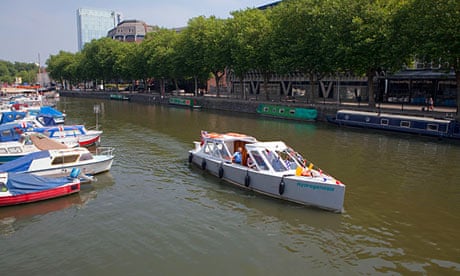The developers of Hydrogenesis, billed as the UK's first hydrogen-powered ferry, are claiming that their rather more modest-looking vessel could help kickstart a new chapter in environmentally-friendly marine engineering.
The ferry service was officially launched on Thursday with skipper Richard Rankin carefully steering the boat past noisier, dirtier diesel ferries, pleasure cruisers and narrow boats. "She handles very well, she's quiet and clean," he said. "And we're surprised how efficient she is. We have a problem with pollution here. It's nice to think that this boat isn't contributing to that at all."
The 11m-long steel boat and the fuel cells that drive the vessel have been made mainly by companies based in south-west England and has received almost £250,000 funding from Bristol city council as part of its successful bid to win green capital status.She The boat has been tested since February and has coped well with icy conditions during the winter and the current heatwave. Scientists, business leaders and politicians have taken trips on the ferry and, for the rest of the summer, members of the public will be able to enjoy the peaceful ride (the only sound is the hum of the gears changing and the gentle splash of water).
Green party councillor Gus Hoyt, the cabinet member with responsibility for the environment, said the boat was an exciting first for Bristol. "It will showcase Bristol, the UK and the world the benefits of a technology that produces zero emissions."
Hoyt said Bristol was determined to become a "laboratory for change", developing pioneering practices that could become a model for cities around the world.
The consortium behind the ferry, which includes companies running conventional boat operations in Bristol, are wary about spelling out how efficient the ferry is. It has been expensive to build the boat and the refuelling station. However, they say they expected to have to replenish the hydrogen tank every day but have only had to do so every four days. A drawback is that the hydrogen has to be brought in by lorry from Hull in north-east England, which increases the project's carbon footprint.
The project has already attracted the attention of other cities, including London and Hanover.
Jas Singh, spokesman for the consortium, said he hoped Hydrogenesis could be the start of a new chapter in Bristol's proud maritime tradition.
Singh said: "The project has put Bristol on the world map amongst the pioneers of the emerging hydrogen economy. This could be the beginning of a new industrial revolution."
